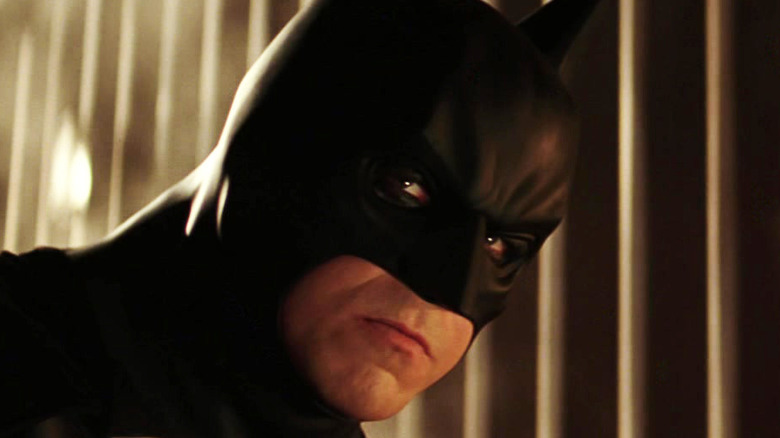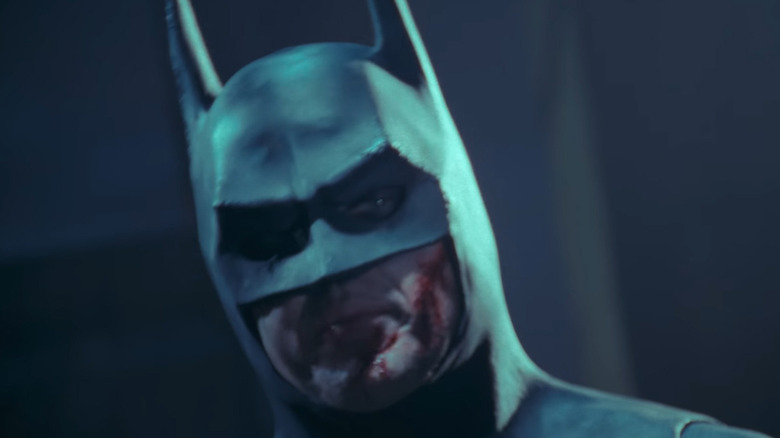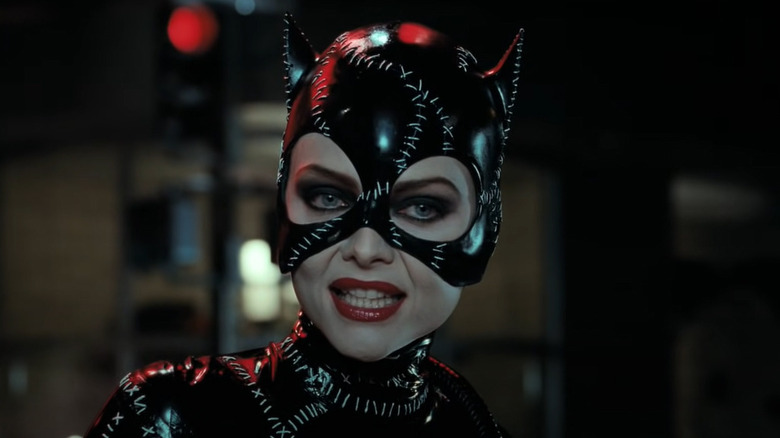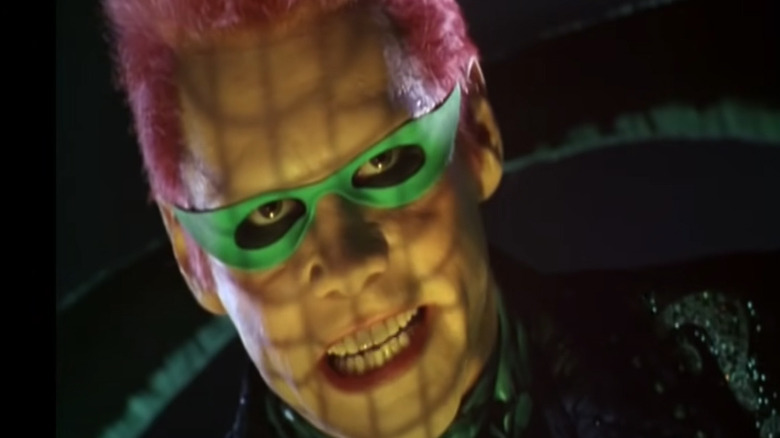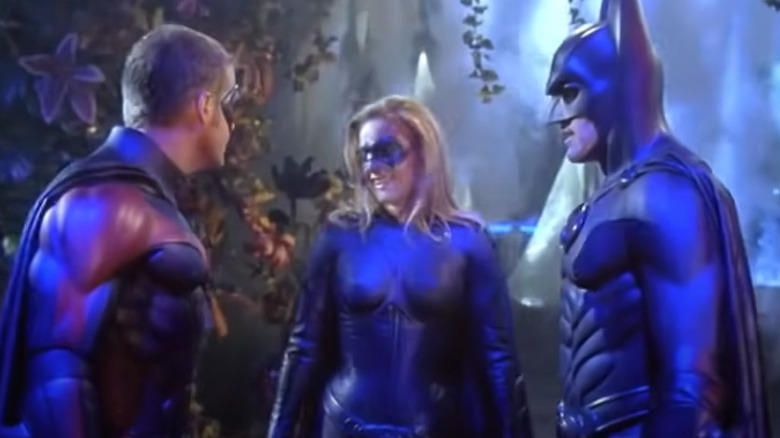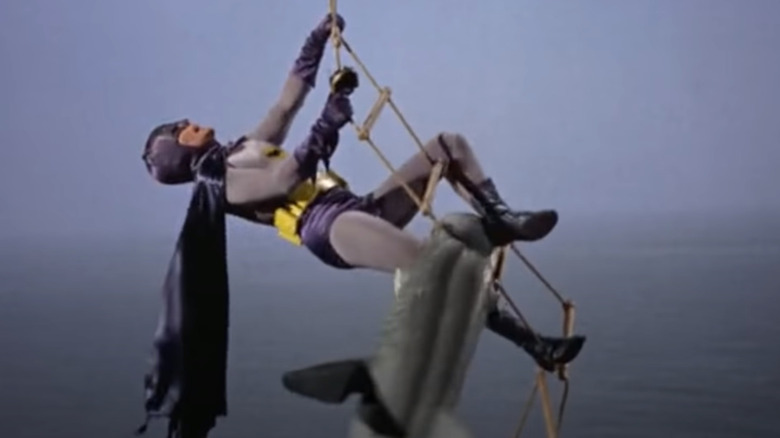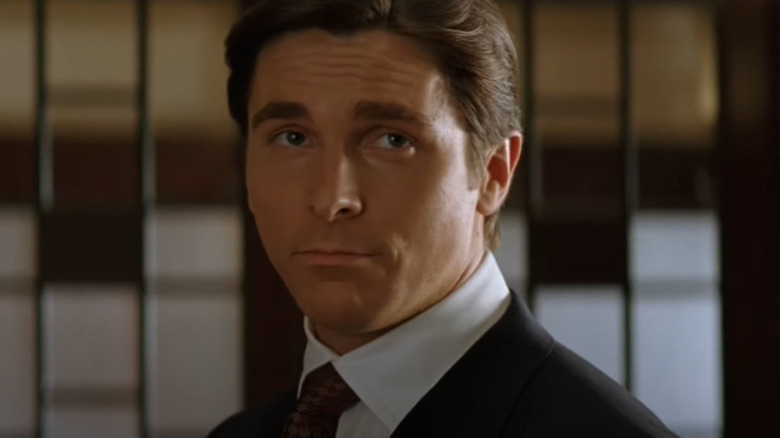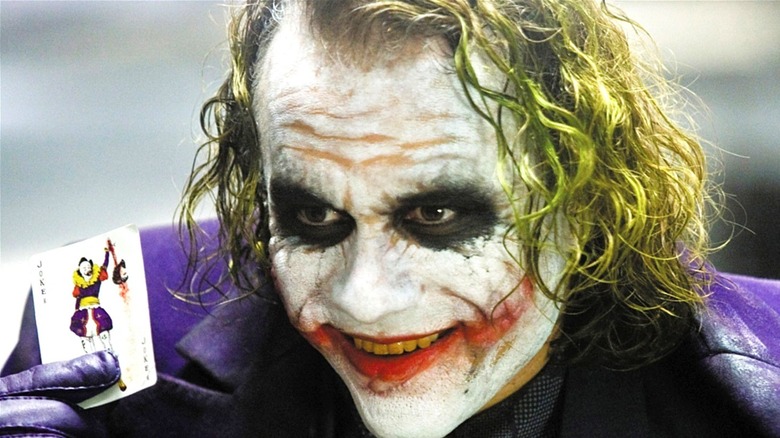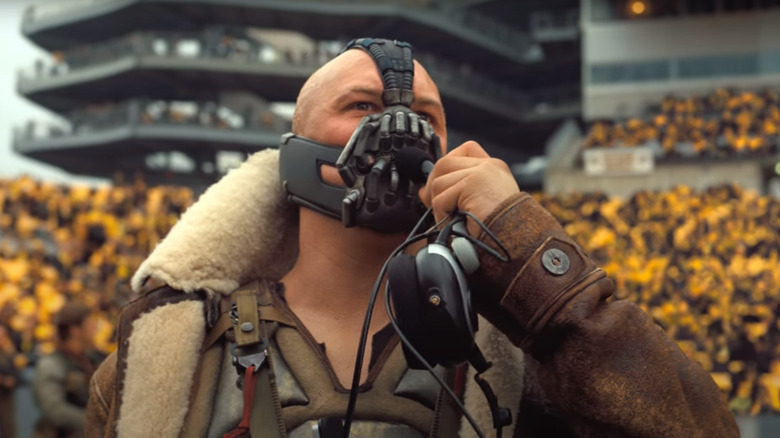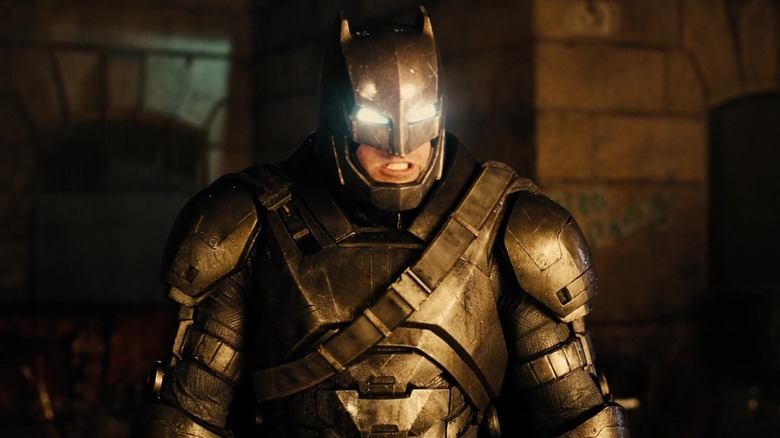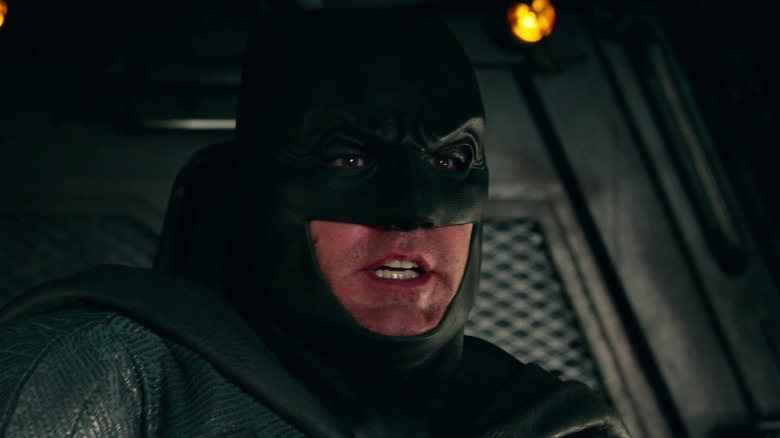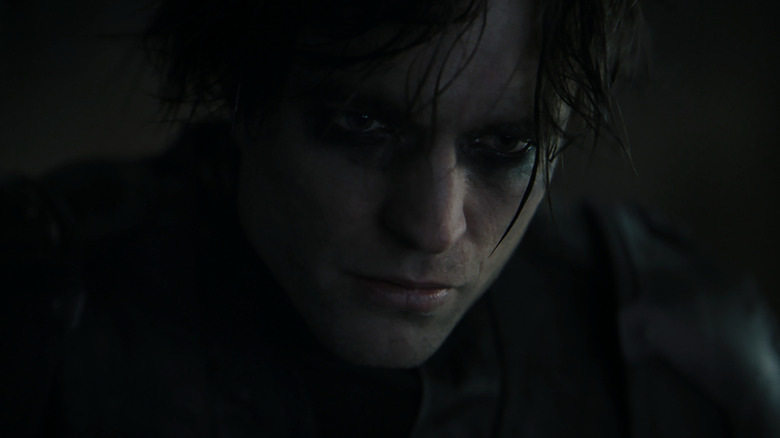This Is The Correct Order In Which To Watch Every Batman Movie
Batman is one of the most widely-recognized fictional characters in the history of storytelling. Without live-action adaptations of the Caped Crusader's adventures — which began all the way back in 1943 — today's blockbuster film industry would look totally different. All that longevity comes with a few baked-in quirks. Batman had his own movie franchise decades ahead of a mainstream culture that took films based on comic books seriously. Thanks to this relatively early start, the Dark Knight has undergone multiple reboots, experienced drastic tonal shifts, and been played by a large slate of leading men.
If your familiarity with Batman-oriented media is limited, but the hype surrounding 2022's "The Batman" has piqued your curiosity about Bruce Wayne's previous onscreen endeavors, where are you supposed to begin? Is there a correct approach to catching up on Bat-films? Well, if we leave out live-action serials, television projects, animated films, and spinoffs starring villains — which, admittedly, amounts to quite a lot — then we can indeed produce the correct order in which to watch every Batman movie. Whether you're an eager newbie or a diehard fan looking to revisit your hero's cinematic exploits, this arrangement is the way to go.
Batman (1989)
If one were so inclined, they might tell you that 2005's "Batman Begins" is a more practical jumping-off point for a neophyte than Tim Burton's first contribution to the franchise. There's solid basis for that argument. In 1989's "Batman," eventual Joker Jack Napier (Jack Nicholson) murders young Bruce Wayne's parents in front of him. Traditional versions of Batman's origin depict nervous, incompetent, anonymous mugger Joe Chill gunning down poor Thomas and Martha Wayne.
That might sound like a trivial change, but it actually makes a significant difference: By removing the randomness and mundanity from Batman's foundational violence and attributing it to a major supervillain, Burton makes Batman's vendetta about a specific evil dude, rather than the abstract concept of crime. There's also the not-inconsequential matter of "Batman Begins" garnering slightly better reviews than 1989's "Batman" did.
So why are we still arguing 1989's "Batman" is the place to start? It's simple: Critical opinion and canon nitpicks aside, 1989's "Batman" set the standard for the plethora of superhero blockbusters to follow. Between its record-breaking box office returns and the corresponding merchandizing bonanza that followed, "Batman" was everywhere during that final year of the '80s. We are still feeling the ripples its enormous splash left in the cinematic marketplace. Thus, it makes sense to watch this "Batman" before "Batman Begins," because without the former, the latter never gets made. It's not crazy to speculate that if we didn't have Burton's "Batman," 2002's "Spider-Man" and 2008's "Iron Man" wouldn't exist, either.
Batman Returns
If you start with 1989's "Batman," then your best bet for sustained continuity is the path laid out by the '90s Batman movie timeline.
That makes your second stop Tim Burton's follow-up, the incidental 1992 Christmas movie "Batman Returns." This sequel marks Michael Keaton's second outing as the Caped Crusader and also boasts Michelle Pfeiffer and Danny DeVito delivering quintessential performances as Catwoman and the Penguin, respectively.
With its dark fairy tale aesthetic and emphasis on damaged outcasts, "Batman Returns" probably has more in common with other Tim Burton projects like 1990's "Edward Scissorhands" than the bulk of superhero movies. It's certainly too macabre for small children — but a PG-13 rating was all Warner Bros. needed to tell moms and dads that "Batman Returns" isn't exactly "The Little Mermaid," right? Well ... not so much. To promote "Batman Returns," Warner Bros. deployed misleadingly kid-friendly marketing — most glaringly, toys in McDonald's Happy Meals — that invited a seething backlash from parents (via Entertainment Weekly) who were miffed their wee ones ended up with Danny DeVito-oriented nightmares for a month.
As long as you learn from their mistakes and keep the kiddies away from this flick, you'll have a great time. You will, however, notice a major departure in tone once you move on. Burton and Keaton both left Batman behind following "Batman Returns," and the decision-makers at Warner Bros., rattled by accusations of family unfriendliness, decided Gotham City needed to get a lot less gothic.
Batman Forever
A more accurate title for this controversial caper might be "The Bright Knight Returns." Fans have been describing Joel Schumacher's pair of Batman movies as torturous viewing experiences for years, though pushback against this take has recently gained steam. They're certainly a lot more colorful and less serious that either Burton movie — and, as a character from a Batman film released years later would ask, why should Batman be so serious?
1995's "Batman Forever" is a financially successful and not-horrifically-reviewed movie, by any metric. It is also utterly consumed by the all-encompassing black hole of kinetic absurdity that is mid-'90s Jim Carrey. Fresh off mega-star turns in 1994's "Ace Ventura: Pet Detective" and "The Mask," Carrey's relentless, rubber-faced Riddler devours this movie. This onscreen dominance is to the apparent chagrin of C+ Two-Face Tommy Lee Jones, who wasn't the only cast member having a rough time. Effectively immobilized by his heavy Batsuit, Val Kilmer left the Batman franchise after "Batman Forever" in order to work on movies where he gets to act instead of fill a rubber costume.
To put it simply, "Batman Forever" is messy. But it's also entertaining, and an important step in Batman's cinematic evolution. Notably, it marks the first cinematic appearance of Dick Grayson since the campy 1966 movie, and the first time Batman is introduced to Robin on the big screen. How the heck have we had three big screen Spider-Mans in the 2000s, but no real Robins? Someone needs to follow up on Schumacher's vision here, STAT.
Batman and Robin
While the movies are more expensive and, in theory, designed for a broader audience, the most influential version of Batman from the '90s is undoubtedly "Batman: The Animated Series." This 1992 cartoon takes its tonal cue from the Burton films while presenting a thoughtful, emotionally mature, kid-friendly iteration of Gotham City. Why did Warner Bros. think they had to make Batman a grinning goofball to appeal to children when their own TV show, based on the same intellectual property, made a strong case to the contrary? Who knows. But we live with the result: 1997's "Batman and Robin."
"Batman and Robin" combines the intellectual development of "Mighty Morphin Power Rangers" with the camp of the 1960s Batman TV show — though it subtracts the latter's delightful tongue-in-cheekiness. Basically, the plot entails Batman (George Clooney) and Robin almost breaking up because Robin (Chris O'Donnell) is visibly pushing 30 and makes no sense as a "Boy Wonder." Arnold Schwarzenegger, occupying the villain spot as Mr. Freeze alongside Uma Thurman's Poison Ivy, behaves like an emotionally-detached murderbot with specialized high-tech weaponry. What keeps Freeze from being a rehash of the T-800 that made his actor's career is a plethora of terrible ice jokes. It is groan-worthy. It is tiresome. But if you get some friends together who are down to laugh at a low point in Batman's history, it's still pretty fun to watch.
Batman: The Movie (1966)
Up until now, we've told you to watch the Batman movies in the order in which they were released. We're shifting gears for 1966's "Batman: The Movie," which predates Burton's "Batman" by more than 20 years. Our thinking is that after "Batman Forever" and "Batman and Robin" have conditioned you into processing a campy Caped Crusader, you should be more receptive to the wholesome hijinks of Adam West and Burt Ward.
Essentially a feature-length episode of the 1960s television series, this flick is defined by a massive villain team-up: The Joker (Cesar Romero), the Penguin (Burgess Meredith), Catwoman (Lee Meriwether) and the Riddler (Frank Gorshin) are all present. "Batman: The Movie" also includes Shark Repellent Bat Spray, a dehydration device that reduces its victims to powder, and a sequence in which Batman declares, "Some days, you just can't get rid of a bomb!"
While there are certain rules Batman always has to follow to remain a coherent character, adhering to grim humorlessness and brutality are not necessarily among them. If the Joel Schumacher films are bad, it's because they rely too heavily on commercialization, not because they let Batman smile every once in a while. The mid-'60s live-action Batman endures as a positive example of a family-friendly Bright Knight. As Batman explains to Superman in Darwyn Cooke's 2004 limited series "DC: The New Frontier," his costume is designed to frighten criminals, not children.
Batman Begins
In hindsight, 2005's "Batman Begins" could have been called "The Modern Era of DC Comics Characters in Film Begins." Galvanized by a need to course-correct for the empty-headed neon flamboyance of "Batman and Robin," Warner Bros. tapped Christopher Nolan — then known for directing psychological thrillers like 2000's "Memento" and 2002's "Insomnia" — to pull Batman back towards his gritty, street-level roots.
"Batman Begins" marks the start of a new timeline: Events that unfold in the Burton and Schumacher movies never occurred in this iteration of Gotham City. Bruce Wayne (Christian Bale) transforms from self-destructive rich kid to ninja trainee to terrifying urban protector with nary a Bat-credit card in sight. The performatively immortal Raʼs al Ghul (Liam Neeson) doles out his master plan more like a megalomaniacal Bond villain than any literal or figurative clown. The closest thing to camp comes in the form of Scarecrow (Cillian Murphy), a living haunted house prop with a vicious streak.
Murphy's Scarecrow steals his share of scenes in "Batman Begins." The mad scientist's kayfabe-breaking question, "Would you like to see my mask?" could've been the Gotham villain catchphrase of its generation, had it not been for the arrival of an even more deranged update of a Batman Big Bad in the follow-up film.
The Dark Knight
Honestly, if you're low on time and want a CliffsNotes version of Batman movies, you can just watch 2008's "The Dark Knight." Not only is this thematically rich sequel to "Batman Begins" widely considered the greatest Batman movie, many believe it's the best superhero movie of all time.
For better or worse, its billion-dollar box office pull is the reason 2013's "Man of Steel" and 2017's "Wonder Woman" aren't as splashy as their previous onscreen iterations. After this movie, dark was the thing to be in DC superhero cinema. Nolan — along with brother Jonathan Nolan and prolific screenwriter David S. Goyer — delivers a psychological action thriller for the ages. Heath Ledger makes naysayers who thought the "10 Things I Hate About You" heartthrob couldn't play an evil psycho look like morons, and set the precedent by which live-action Jokers continue to be judged. Christian Bale, Aaron Eckhart, Maggie Gyllenhaal, and Gary Oldman crank out stellar performances as well, though they're all instantly overshadowed. Ledger's Joker is simply too spectacular to be ignored.
The Dark Knight Rises
In order to examine 2012's "The Dark Knight Rises" for what it truly is, we have to push a mountain of critical discourse aside. Some folks will tell you that "The Dark Knight Rises," Nolan's final entry in the franchise, is better than "The Dark Knight." Others say that "The Dark Knight Rises" gets a little too tangled up in itself at certain points, but ultimately wraps this version of Bruce Wayne's saga up with all the mythic grandeur the assignment requires. Some think "The Dark Knight Rises" falls flat on its face. It earned solid reviews and made decent money, which means public opinion can only be so bad, no matter what the loudest people on the internet think. The fact is, anything following "The Dark Knight" was always going to feel like a tiny bit of a let-down.
If you accept that, however, you'll realize this film has a lot to offer. Bale is as strong a Batman as ever, going out on a definite high note. As for the villains, Anne Hathaway adds a world-weary sense of snark to Selina Kyle's classic moral ambiguity that works like gangbusters. And then there's Bane — by some insane fluke of fate, not the superhero role "Venom" star Tom Hardy is currently best known for. Yes, his voice is a little weird, but his genuine presence as the masked baddie is irresistible.
Batman v. Superman: Dawn of Justice
Speaking in broad generalizations that, by definition, have loads of exceptions, we can assert that most folks tend to dislike Joel Schumacher's version of Batman and generally enjoy Christopher Nolan's. That brings us to Zack Snyder's take on Bruce Wayne, a role filled by Ben Affleck. This rendition is loathed by some, and utterly beloved by others.
Whatever your personal take on Batfleck happens to be, it's safe to say 2016's "Batman v Superman: Dawn of Justice" is where Batman gets real weird. Therefore, we're placing it, and its sequels, at the end of our watch order. The fact that this happens to match the sequence in which these movies came to be in real life only sweetens the deal.
After observing that Superman (Henry Cavill) can level an entire major city whenever he feels like it, Batman devises a plan to put the Man of Steel in the ground. Or maybe Lex Luthor (Jesse Eisenberg) manipulates Batman into going after Superman? We're still not clear on what the plot of "Batman v Superman," which received infamously terrible reviews, is supposed to be. But even if the story is confusing, the defining theme of this flick couldn't be clearer: Batman's mom was named Martha, and Superman's adopted mom is also named Martha.
Justice League
If your purpose in this endeavor is to watch every Batman movie, then the 2017 edit of "Justice League" overseen by director Joss Whedon, and 2021's "Zack Snyder's Justice League," the re-edit released on HBO Max, both do the trick. These two films tell essentially the same story, and are equally relevant to Batman's overall place in the pop cultural universe. But if time isn't a factor — the "Snyder cut" is literally twice as long as Whedon's two-hour "Justice League" — we think even the most adamant Snyder critics would probably admit his take is more worth watching.
Whedon's film has its moments, but amounts to a bland exercise in pushing a handful of intellectual properties through the market-demanded motions. Meanwhile, the Snyder cut is a maximalist cataclysm of R-rated action-fantasy lunacy. "Justice League" is a corporate product; it is not art. The Snyder cut is also a corporate product ... but maybe it is art?
Also, Snyder adds a scene in which the Joker (Jared Leto) heavily implies he murdered Robin at some point during the Snyder-verse DC timeline. That extra dash of depressing info gives the movie a connection to Batman comics — specifically, 1988's "Death in the Family." Whedon's "Justice League" lacks this, and is thus a lesser choice for a Batman-centric movie marathon. There's more Batman stuff in the Snyder cut, just as there is more of literally everything else.
The Batman (2022)
"The Batman" has opened to generally positive feedback and appears highly likely to produce a sequel or two. However, for right his second, it's a provisionally standalone film whose identity within Batman's film oeuvre has yet to fully take shape. We're marking it as the final film in our list essentially because it's the most recent, but a Bat-fan in the midst of a Bat-movie marathon has a few different options for placement of "The Batman."
From the standpoint of its central character's evolution, "The Batman" could fit before the Burton/Schumacher series. Though "The Batman" is not an origin story in the traditional sense, Robert Pattinson's depiction of Bruce Wayne begins the film a little underbaked. He only starts growing into a hyper-competent crime smasher resembling the guy from 1989's "Batman," at the movie's conclusion.
Then again, since culture and world events of the 2000s heavily inform Nolan's trilogy, while director Matt Reeves's infused sentiments of the 2010s and early 2020s into his Gotham City saga, maybe it makes more sense to watch them in their real-world release order.
We do not recommend watching "The Batman" immediately before or after "Batman: The Movie," because the tonal clash between Paul Dano and Frank Gorshin's interpretations of the Riddler may cause the viewer some internal whiplash or psychic damage. Gorshin's Riddler never successfully kills anybody, while Dano's Riddler kills a whole score of folks in nasty ways.
